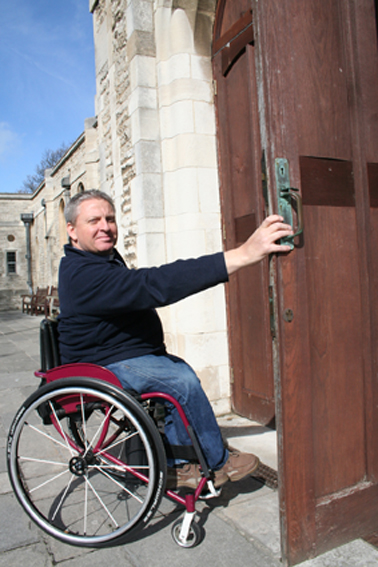Worshippers urge Chancellor to abandon VAT change
WORSHIPPERS are being urged to campaign against a ‘heritage tax’ that would send the cost of church improvements soaring.

The Rev John Naudé at the main, south, entrance to our cathedral
They’ve highlighted how a change to VAT rules could affect a project to help disabled worshippers and visitors enter our cathedral. A £30,000 project to transform its main entrance is now likely to cost £6,000 extra, thanks to proposals announced in the recent Budget.
Chancellor George Osborne unexpectedly announced that VAT should be charged on alterations to listed buildings. It means congregations that have worked hard to secure grants or raise money to improve their church could see their bills rise by 20 per cent.
The Church of England calculates this could add £20m every year to work on its 12,500 listed buildings. It will hit plans to build extensions, kitchens, toilets, new entrances and re-ordering so churches can be used more widely by community groups. In some cases that work may now simply not take place.
Worshippers are now urging Mr Osborne to change his mind. An e-petition on this issue is the fastest-growing one on the Downing Street website at the moment and already has more than 21,500 signatures.
The Rev John Naudé, vicar of Church of the Good Shepherd in Crookhorn, who uses a wheelchair and attends the cathedral for diocesan events, would welcome the new entrance.
“At the moment, you end up struggling to get through two sets of wooden doors and are then faced with a step,” he said. “There are ramps that take you left or right, but it would be helpful if the entrance was re-designed.”
And the Very Rev David Brindley, dean of Portsmouth Cathedral, said: “We have regular disabled worshippers and a toddler group that attracts 20 or so mums and dads with pushchairs, as well as visitors who use this entrance during the week. We wanted to make it more welcoming and accessible by installing automatic glass doors and removing the step just inside the entrance.
“This unnecessary extra VAT burden will just make our plans and those of thousands of other churches and cathedrals around the country more difficult to achieve.”
The cathedral’s plan to re-design the south entrance is part of a wider ‘Let the Building Speak’ project designed to make the cathedral more accessible for visitors. It’s already seen a reorganisation of the entrance area and the installation of a video screen showing images from the cathedral’s year.
The Rev David Power, vicar of St Cuthbert’s in Copnor, which was transformed in a £4.5m project to create a GPs’ surgery and community facilities, said: “Under these new arrangements, we simply wouldn’t have been able to do this. An extra 20 per cent bill would have made it impossible.”
And a project to re-order the back of St Peter and St Paul Church in Hambledon to create a welcome area and safe place for children during services could also be hit. Work is likely to cost £10-£15,000, meaning that any VAT charged could add up to £3,000 to the bill.
Bishop Christopher said: “This is a real blow for hard-working church congregations who faithfully hold their coffee mornings and sponsored events to raise enough money to help preserve and develop the nation’s heritage. It’s a real scandal.
“Imagine how disheartening it is for a congregation, which might have scrimped and saved for years to improve their building for the sake of their local community, suddenly to be hit with a VAT bill for 20 per cent extra.”
VAT has always been payable on repairs to listed buildings, and churches can then claim the VAT back via the Listed Places of Worship Grant Scheme. However, those funds have been substantially reduced, meaning that churches can’t always claim back 100 per cent of the VAT they have paid.
Prime minister David Cameron has claimed that churches can claim back the VAT paid on alterations in the same way. But as no extra funding for this scheme has been announced, it suggests that the same amount of money will just be spread more thinly.
Some transitional arrangements have also been announced. Alterations with a signed contract in place by March 21, 2012, will still be zero-rated if the work is done by March 20, 2013. Any work done after this will be charged VAT at the standard rate. If a contract wasn’t signed before March 21, 2012, any work completed after October 1, 2012, will also be charged VAT at the standard rate.
Anglican worshippers and others are being urged to write to their MPs to complain about the change, including details of the impact on their communities. You can also sign the Downing Street petition on http://epetitions.direct.gov.uk/petitions/32229 before June 30.